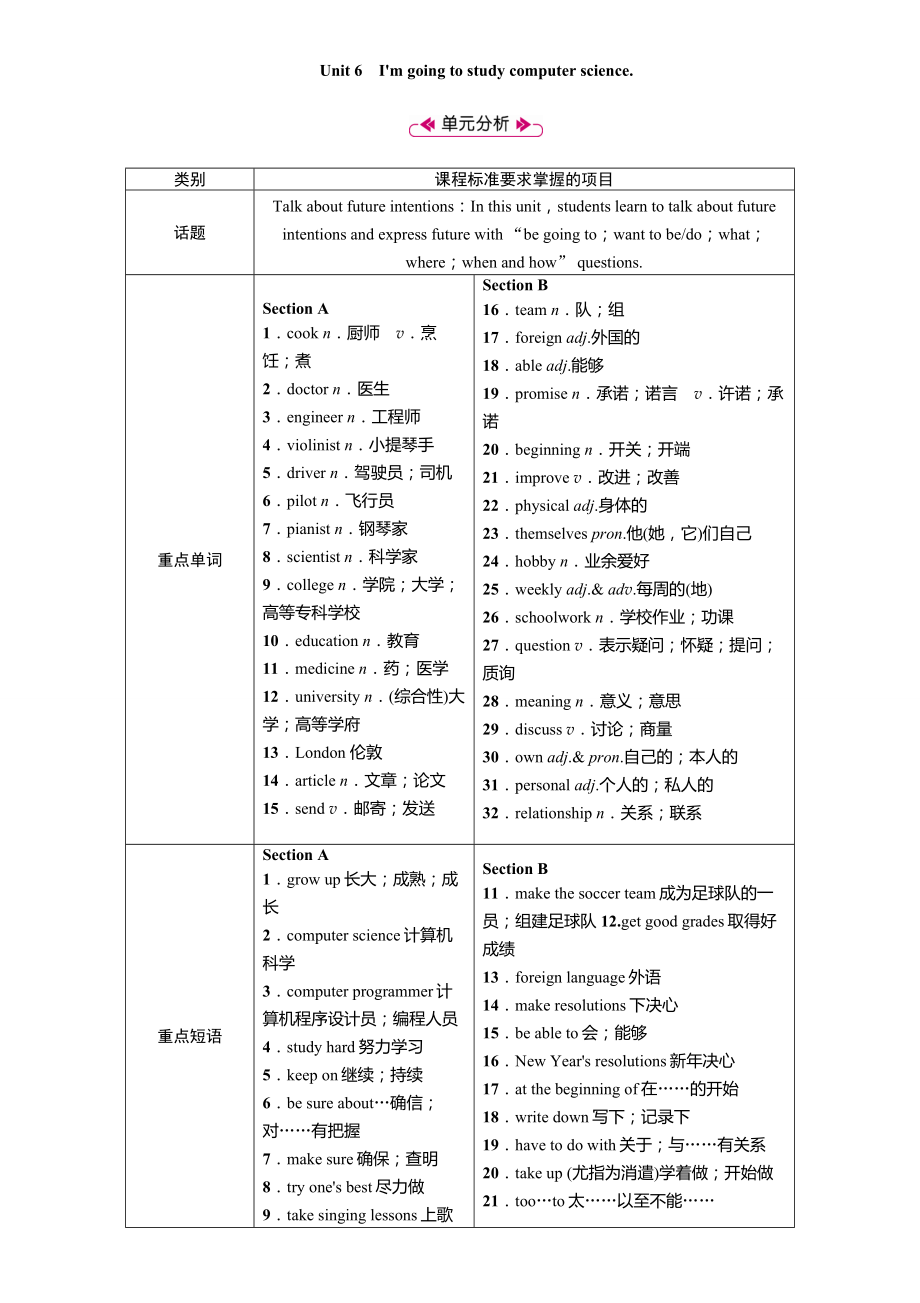《人教版八年級上Unit 6I'm going to study computer science1 Section A (1a-1c)教案》由會員分享�����,可在線閱讀��,更多相關(guān)《人教版八年級上Unit 6I'm going to study computer science1 Section A (1a-1c)教案(5頁珍藏版)》請?jiān)谘b配圖網(wǎng)上搜索��。
1����、Unit 6 I'm going to study computer science.
類別
課程標(biāo)準(zhǔn)要求掌握的項(xiàng)目
話題
Talk about future intentions:In this unit����,students learn to talk about future intentions and express future with “be going to���;want to be/do��;what����;where�����;when and how” questions.
重點(diǎn)單詞
Section A
1.cook n.廚師 v.烹飪�����;煮
2.doctor n.醫(yī)生
2���、
3.engineer n.工程師
4.violinist n.小提琴手
5.driver n.駕駛員����;司機(jī)
6.pilot n.飛行員
7.pianist n.鋼琴家
8.scientist n.科學(xué)家
9.college n.學(xué)院�;大學(xué)�����;高等?�?茖W(xué)校
10.education n.教育
11.medicine n.藥;醫(yī)學(xué)
12.university n.(綜合性)大學(xué)���;高等學(xué)府
13.London 倫敦
14.a(chǎn)rticle n.文章���;論文
15.send v.郵寄;發(fā)送
Section B
16.team n.隊(duì)�;組
17.foreign adj.外國的
3、
18.a(chǎn)ble adj.能夠
19.promise n.承諾�;諾言 v.許諾;承諾
20.beginning n.開關(guān)�;開端
21.improve v.改進(jìn);改善
22.physical adj.身體的
23.themselves pron.他(她�����,它)們自己
24.hobby n.業(yè)余愛好
25.weekly adj.& adv.每周的(地)
26.schoolwork n.學(xué)校作業(yè)����;功課
27.question v.表示疑問����;懷疑����;提問;質(zhì)詢
28.meaning n.意義���;意思
29.discuss v.討論�����;商量
30.own adj.& pron.自己的���;本
4、人的
31.personal adj.個(gè)人的�����;私人的
32.relationship n.關(guān)系��;聯(lián)系
重點(diǎn)短語
Section A
1.grow up長大�����;成熟;成長
2.computer science計(jì)算機(jī)科學(xué)
3.computer programmer計(jì)算機(jī)程序設(shè)計(jì)員��;編程人員
4.study hard努力學(xué)習(xí)
5.keep on繼續(xù)��;持續(xù)
6.be sure about…確信���;對……有把握
7.make sure確保�;查明
8.try one's best盡力做
9.take singing lessons上歌唱課
10.take acting less
5�、ons上表演課
Section B
11.make the soccer team成為足球隊(duì)的一員���;組建足球隊(duì)12.get good grades取得好成績
13.foreign language外語
14.make resolutions下決心
15.be able to會����;能夠
16.New Year's resolutions新年決心
17.a(chǎn)t the beginning of在……的開始
18.write down寫下���;記錄下
19.have to do with關(guān)于���;與……有關(guān)系
20.take up (尤指為消遣)學(xué)著做;開始做
21.too…to太……以至
6�����、不能……
重點(diǎn)句型
1.—What do you want to be when you grow up?你長大后打算干什么����?
—I want to be a basketball player.我想當(dāng)一名籃球運(yùn)動員。
2.—How are you going to do that����?那你打算怎么做呢?
—I'm going to practice basketball every day.我打算每天練習(xí)打籃球����。
3.—Where are you going to work?你準(zhǔn)備去哪里工作�����?
—I'm going to move to Shanghai.我準(zhǔn)備搬到上海�。
4.—
7、When are you going to start����?你打算什么時(shí)候開始?
—I'm going to start when I finish high school and college.我打算高中及大學(xué)畢業(yè)的時(shí)候開始��。
單元語法
Learn to express future with “be going to do;want to be/do�����;what����;where;when and how” questions.
知識目標(biāo)
掌握課文中重點(diǎn)詞匯及相關(guān)短語�,并靈活運(yùn)用。
能力目標(biāo)
學(xué)會用一般將來時(shí)(be going to)談?wù)搲粝牒臀磥淼挠?jì)劃���。
情感目標(biāo)
通過對人生的
8����、討論����,樹立自己的人生目標(biāo)����。
【課時(shí)建議】本單元建議5課時(shí)
Section A (1a-1c)(一課時(shí))
Section A (2a-2d)(一課時(shí))
Section A (Grammar Focus-3c)(一課時(shí))
Section B (1a-1e)(一課時(shí))
Section B (2a-Self Check)(一課時(shí))
詞匯短語:主要采用圖片及多媒體展示助記法。
基本句子:采用多媒體展示及交際法(利用多媒體展示兩人進(jìn)行交際時(shí)的情景)�。
語法:就本單元話題“Future intentions”運(yùn)用一般將來時(shí)談?wù)撐磥淼拇蛩悖磉_(dá)未來,采用free talk加深印象���。
9�、
第一課時(shí) Section A (1a-1c)
主備內(nèi)容
Section A (1a-1c)
教學(xué)目標(biāo)
【知識目標(biāo)】
Important words:cook�,doctor,engineer�,violinist,driver�����,pilot����,pianist,scientist
Important phrases:grow up�,computer science,computer programmer�,study hard
Important sentences:
1.—What do you want to be when you grow up?
—I wa
10、nt to be a basketball player.
2.—How are you going to do that?
—I'm going to practice basketball every day.
【能力目標(biāo)】能學(xué)會關(guān)于職業(yè)的詞匯與詢問未來的打算的句型�。
【情感目標(biāo)】通過開展小組學(xué)習(xí)活動,培養(yǎng)協(xié)作意識���;并能認(rèn)識到要為實(shí)現(xiàn)未來的打算而采取行動���。
教學(xué)重難點(diǎn)
重點(diǎn):學(xué)會關(guān)于未來的詞匯與詢問未來的打算�����。
難點(diǎn):通過交流表達(dá)和聽力訓(xùn)練�����,引入各種學(xué)習(xí)方法和策略來學(xué)習(xí)“be going to”句型�。
教法學(xué)法
情景教學(xué)法��;聽讀法��;小組合作學(xué)習(xí)
Step 1 自
11�����、主學(xué)習(xí)
【新詞自查】
根據(jù)句意及首字母或漢語提示完成句子����。
1.What are you going to be when you grow__ up?
2.My uncle is an __engineer__(工程師) in a factory.
3.My father works in a hospital.He is a __doctor__(醫(yī)生).
4.I want to be a __violinist__(小提琴手).
5.—Who is that __driver__(駕駛員) in the red car?
—She is my mother.
6.Sul
12���、ly(《薩利機(jī)長》) tells a story about a pilot__.
7.—Do you like playing the piano?
—Yes.I want to be a __pianist__(鋼琴家).
Step 2 情景導(dǎo)入
【參考案例】
T:Hello��,everyone�����!We know every child has his own great idea.I think you do the same.When you grow up����,maybe you want to be a teacher,a businessman�,a pilot or an en
13、gineer.Today we are going to talk about the topic about your future intentions.Turn to look at Unit 6:I'm going to study computer science.
Ss:I want to be a…when I grow up.
T:How are you going to do that?
Ss:I'm going to…
設(shè)計(jì)意圖:通過談?wù)搶W(xué)生未來的職業(yè)理想導(dǎo)入課題����,激發(fā)學(xué)生學(xué)習(xí)本單元的興趣。同時(shí)也可以通過呈現(xiàn)一些關(guān)于職業(yè)的圖片來引導(dǎo)學(xué)生談?wù)撟约何磥硐胍獜氖碌穆殬I(yè)���。
14�、
Step 3 完成教材1a-1c的任務(wù)
【參考案例】
A:What do you want to be when you grow up?
B:I want to be a basketball player.
A:How are you going to do that?
B:I'm going to practice basketball every day.
【操作案例】
1.要求學(xué)生翻開課本P41���,理解1a中職業(yè)名詞的意思�����。并按要求完成課本上相應(yīng)的任務(wù)�。
T:On Page 41 you will find a box with 12 different jobs
15、.Now you are going to rank the 12 jobs from the most interesting to the least interesting.And after that you shall fall into pairs to talk about the reasons.
2.檢查答案��。要求全班檢查并討論答案��。
3.鞏固訓(xùn)練����。
4.要求學(xué)生聽第一遍錄音,并完成課本上1b的聽力任務(wù)��。
5.要求學(xué)生聽第二遍錄音�,把兩個(gè)欄目中的短語連線。
6.播放錄音�����,并逐句進(jìn)行跟讀��。
7.完成教材1c的任務(wù)�,并邀請2-3名同學(xué)當(dāng)堂表演。
設(shè)計(jì)意圖:通過學(xué)習(xí)1
16�����、a�����,讓學(xué)生掌握一些職業(yè)名詞����,了解相關(guān)職業(yè)的特點(diǎn)。通過1b培養(yǎng)學(xué)生的聽力技巧���,聽懂本單元所學(xué)習(xí)的目標(biāo)語言�����。通過1c訓(xùn)練學(xué)生的口語表達(dá)能力����,進(jìn)一步鞏固所學(xué)的目標(biāo)語言����。
知識點(diǎn)撥
▲ be going to結(jié)構(gòu)
在英語中,be going to 結(jié)構(gòu)表示人的打算����,be going to后接動詞原形,be動詞隨主語的人稱變化而變化���。另外��,be going to還表示一種有跡象的預(yù)測�����。be going to表示根據(jù)主觀判斷要發(fā)生的事情�����,will表示客觀上必然要發(fā)生的事情����。
Step 4 板書設(shè)計(jì)
Section A (1a-1c)
Important words:cook,docto
17��、r����,engineer,violinist��,driver�,pilot,pianist�,scientist
Important phrases:grow up���,computer science�,computer programmer,study hard
Important sentences:
1.—What do you want to be when you grow up?
—I want to be a basketball player.
2.—How are you going to do that?
—I'm going to practice basketball every day.
在本節(jié)課中��,學(xué)生們預(yù)習(xí)了單詞和短語���,在1c環(huán)節(jié)中使用1a中的職業(yè)進(jìn)行對話練習(xí)時(shí)����,他們都能積極參與�,每個(gè)人都能大膽地說英語,值得鼓勵和表揚(yáng)��。
 人教版八年級上Unit 6I'm going to study computer science1 Section A (1a-1c)教案
人教版八年級上Unit 6I'm going to study computer science1 Section A (1a-1c)教案

